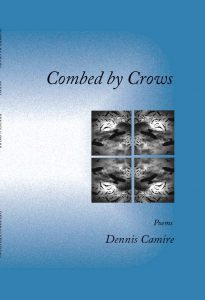Combed by Crows
ISBN: 978-0-9975051-6-0
6 x 9; 96 pages; $17.49
The most striking aspect of Dennis Camire’s poems is how they recalibrate our lens on the familiar. They celebrate poignant moments when honest curiosity allows a reader to assume an unfamiliar point of view. Like the widow feeding seagulls, one can “feed with like greed on all the grace” in these swooping poems, and be consoled on the way “through grief ’s coastal gales.” If we need reason for awe, read “The Song of Our Cells”: our most basic rejuvenation is cause for amazement.
Camire's poems show us by example that abstraction and transcendence are not required to practice presence. The poems reflect on plain moments observed with gentle humor while buying groceries, gardening, repairing a stone wall, fishing for trout. Such moments are not abstractions. They reveal that what might seem banal is layered and often cause for solace. Like St. Augustine, Dennis reminds us over and over that “love draws us to the things of this world.” And what a lovable world his is.
—Jeanine Hathaway, Vassar Miller Prize, 2001, The Self as Constellation
Dennis Camire teaches writing at Central Maine Community College and at the University of Maine, Augusta. The former director of Maine Poetry Central, currently he curates the poetry column, In Verse: Maine Places and People, for The Sun Journal. His poems have appeared in The Mid American Review, Poetry East Magazine, Spoon River Review, Off the Coast, Three Nations Anthology and other magazines and anthologies. He lives in a A-frame in West Paris, Maine.
To apply Dennis Camire’s own words to himself, he is indeed a “birder of words” working at “altruism’s altitude.” If all poetry implies a vision, what the poems in Combed by Crows see is how important beauty is in a broken world—beauty and compassion—how they can be found almost anywhere, in the autistic boy trying to get a date, in giant pumpkins and lowly earthworms, in our language itself, from the letters of the alphabet to the many names of fishing lures. Camire sees and celebrates it all, not denying our wounds, but finding in them the source of love. These poems become models of attention and curiosity, gratitude and a full-hearted embrace of experience. T he images are vivid and compelling, the syntax becomes a river, carrying us through an amazing series of verbal rapids without once tipping us over. I love this book. It’s like the donated organs described in one poem, giving our tired cynical minds a transplant of marvel and wonder.
—Betsy Sholl, Former Maine Poet Laureate
What Dennis Camire does best with inventive, metaphoric language is to praise “this world’s strange beauty.” But even more important than this, he never lets us forget those who are seemingly excluded from paradise: the autistic, the maimed, the disfigured. Thus among kids “whose eyebrows dragonfly with delight” and “the purple and green roots” of their hair, we find in the same park “the mother with/Down’s syndrome child in tow/slow to marvel/at this Garden of Eden of Teens/ . . . the way he always blossoms/that same smile to each unexplained glory.” I grinned and cried at these poems, but seldom separately because Camire knows the inextricable intimacy of laughter and tears.
Spurred to dreaming by these wonderful lines, I, too, began to imagine, and there were his forebears, Gerard Manley Hopkins and Ogden Nash, meeting somewhere outside of time and space, sharing this book. And why not?—these three poets of pied beauty and dappled things.
—Bruce Guernsey, former editor of The Spoon River Poetry Review and author of From Rain: Poems, 1970-2010

